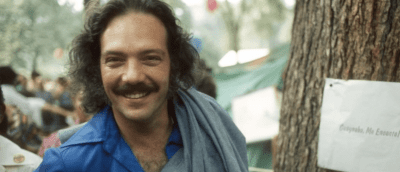Rachel Sennott in 'Shiva Baby'
Without boundaries: ‘Shiva Baby’ auteur on her smash debut and what’s next
Emma Seligman discusses making a movie just for young queer women, the genius of 'Yentl' and whether she'll ever return to New York
Emma Seligman will be back.
The Toronto native is still fresh off the successful release of her debut feature film “Shiva Baby,” an anxiety-fueled comedy based on her New York University thesis short of the same name. And now, she is a day away from catching a plane to her new home in Los Angeles. But she will be back.

Seligman (Photo by Allison Valiquette)
“It feels like a new chapter right now and I’m excited to return to New York, when I can be free of all the college anxieties and insecurities I associate with it. Leaving the city you lived in from age 18-24 feels like the right move.”
Filmed in Bushwick in 2019, “Shiva Baby” is a hilarious and claustrophobic day in the life of Danielle, a senior in college that runs into her ex-girlfriend and sugar daddy at a Jewish funeral service with her family. It’s a tense and entertaining showcase of Seligman’s talents as a writer and director, streaming on HBO since April, where it has received widespread acclaim, obsessed over by young queer women, won awards, and made a cult star out of titular baby Rachel Sennott.
Brooklyn magazine caught up with Seligman to discuss the film—and what’s next. This interview has been edited for clarity and flow.
You wrapped “Shiva Baby” right as the pandemic hit. What was that timeline like?
We finished on Friday. Wednesday was the day the NBA was canceled. The Europe travel ban went into place and then Tom Hanks got it. Remember that was all on the same day? Really important situations, sort of in that order: NBA, travel ban, Tom Hanks.
“Shiva” examines (in beautiful, anxious detail) the way we as womxn work to gain our own power—sexually, with our parents, in our careers—what did building this character mean for your own sense of power?
When I wrote the short film, I felt the exact same way as Danielle but didn’t realize it. I sort of vomited her and her insecurities out of me. Taking ownership over this narrative didn’t aid my sense of power until we released the movie. At that point, I felt a huge weight off my shoulders and it made me feel more in control to know that other womxn connected to Danielle’s story.
What was it like to create and share a story exploring sex positivity and sugar babies?
I honestly grew up in a house without boundaries and that includes sexually themed conversation. It’s never been taboo for me or my family or my community or my friends and I think all my friends had experiences like this; you’re trying to gain validation in different ways, you’re desperate and you’re making some messy decisions. I didn’t really think, oh wow, I’m putting myself in a glass. I feel like I just was making something that we could all relate to.
I have described “Shiva Baby” as the film anxious bisexuals have been waiting for. Who was this film “for” to you, and how did that audience receive it?
It was for young bisexual womxn. And then beyond that, for young womxn in general. I remember when my producers and I were trying to pitch this movie for financing, we talked about how we hoped “Shiva Baby” would reach everyone, but that our target demographic was young bisexual (or queer) womxn. If we received no success from anyone else but this audience, I would have still felt like we did our job.
What is something you learned as a first time filmmaker that you’ll bring to your next project?
I learned that filmmaking takes quite an emotional and physical toll on your body, especially if you are telling a somewhat personal story. I think I assumed that I could handle not taking care of myself because I was young. I tried to prepare myself for making my first feature by listening to as many interviews with directors I could find but that doesn’t really come up. Perhaps this is because it’s still a male-dominated field, I’m not sure.
What topics or narratives are on your mind right now as you move into what comes next? What’s nagging at you story-wise?
I think I used to see my career as having an agenda to explore these topics but now I am having fun being open to stories that don’t come with a predetermined topic ruminating in my head. I’d like to continue to tell queer female and Jewish female stories but after diving into the horrors of and heaviness of “Shiva Baby” (even though it’s a comedy), I’d like to give these audiences and myself a little more fun and lightness.
I need to mention my personal hero, who directed a film that was a huge inspiration for you: Barbra Streisand and “Yentl.”
On a technical level, the gorgeous amber candle-lit lighting of Yentl informed the way we lit “Shiva Baby.” But on an emotional level, I’ve long felt so inspired by how Barbra made her first film such a boldly Jewish story about the limitations of womanhood and gender. For a 1983 movie, it also has such a strong female gaze in the way she drools over Mandy Pantinkin’s character (who is beautiful). I find it unbelievable that this was her directorial debut.
So much of your career has its roots in New York, from where you were educated to creating “Shiva” in all its forms. What has the city meant to your career?
New York’s Jewish community is not in my blood the way Toronto’s is but the competitive and fast-paced energy of New York has greatly affected me. I got so much fuel and momentum from living in a city where everyone is busting their ass to “make it” in their field. Running yourself into the ground in New York is not necessarily a good thing, but for better or for worse, it allowed me to keep pushing until I had no more fuel left. I never thought I would be a “7 year itch” person. I decided I needed to leave it so I could miss it.
What’s next for you career-wise?
I’ve got my hands dirty, but at the same time, I have no idea if anything is going to happen. It’s kind of like filming. Because with “Shiva,” it was so much sort of manifesting energy from all of us: We’re doing it, we’re doing it. So I’m putting a little bit of that energy into it. It’s a nice place to be.
You might also like 


























